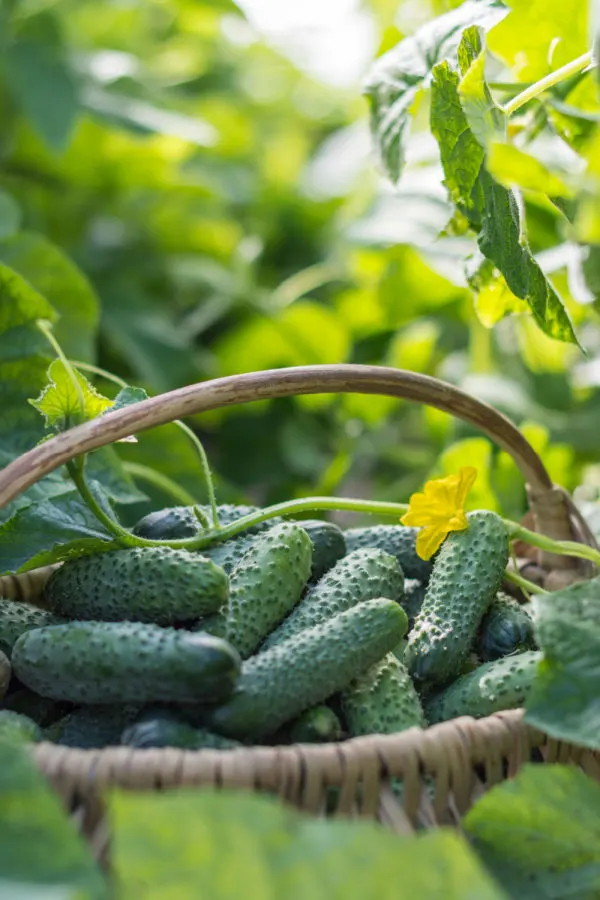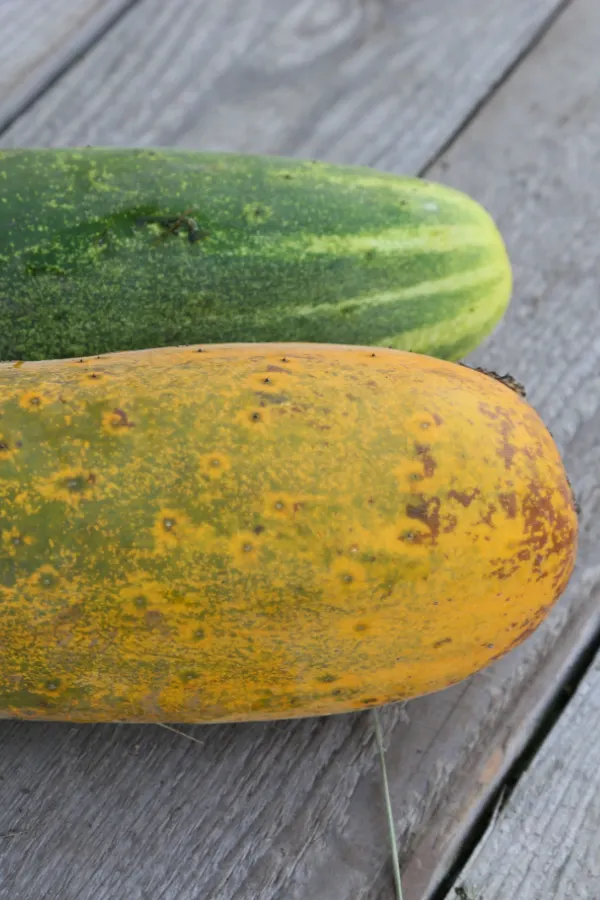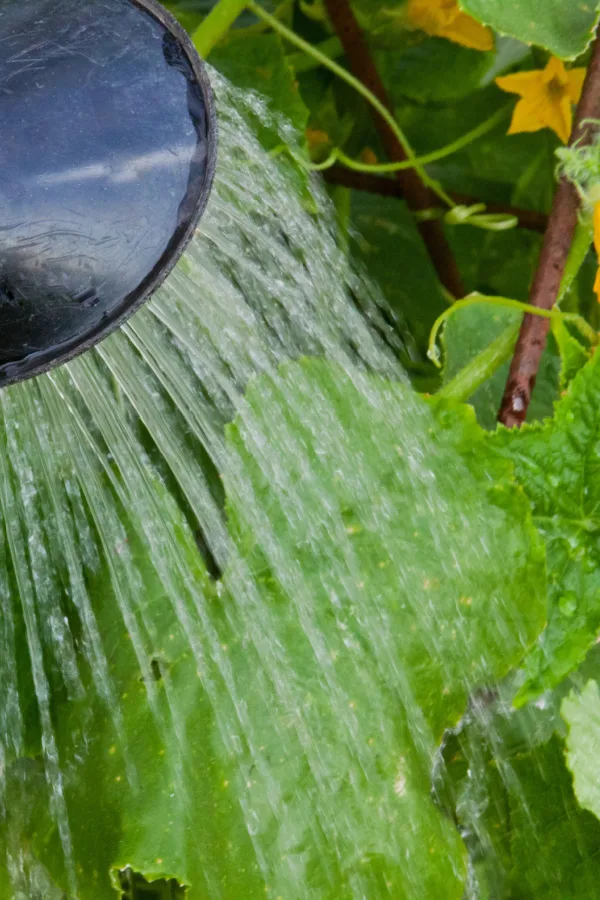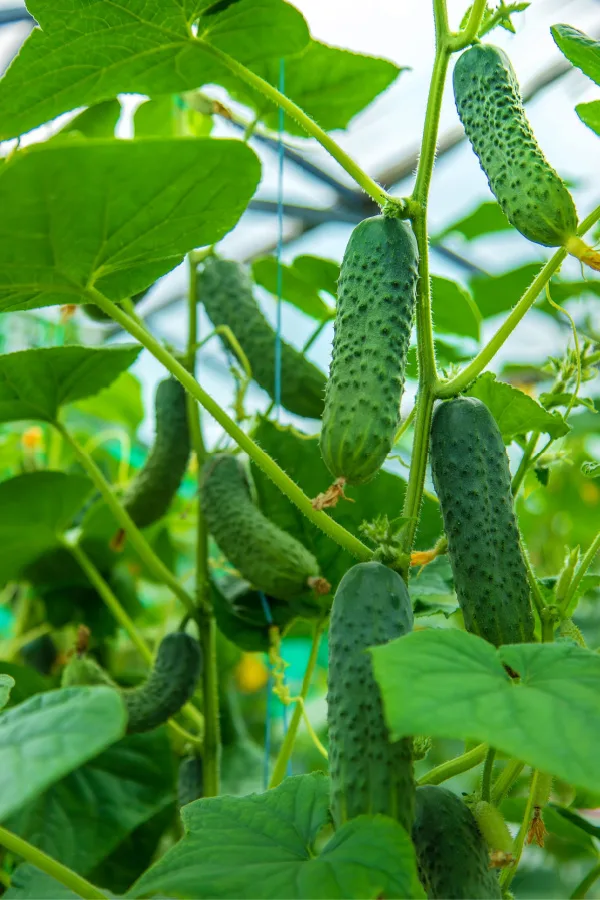Looking for a few secrets and tips to keep your cucumber plants healthy and productive all summer long?
Cucumber plants can produce some serious yields when properly maintained and cared for during the growing season. In fact, a single plant can provide as much as 20 to 25 pounds of fruit throughout a single year!
That can come in handy for those looking not just to have fresh cucumbers, but make lots of pickles too. But to produce those amazing results, they need help. Not just at planting time – but all throughout the summer and early fall to keep them flowering and even more important – full of tasty cucumbers!

Early in the season, most cucumber plants have little difficulty performing well. With fresh soil and cooler temperatures, the plants produce plenty of foliage and bright yellow blooms. But for many gardeners, by mid-summer, their plants start to show a few signs of slowing down or even dying back.
Why is this so common? Well, almost always, it comes down to a few simple needs not being met for the plant. The good news is that those needs are usually fairly easy to remedy. In fact, if you stay ahead of the game and provide them in advance, your plants won’t even miss a beat right up until the first frost of fall!
With that in mind, here is a look at how to make this the year you give your cucumber plants what they need all summer long – and get a huge harvest in return.
The Simple Secrets To Keep Your Cucumber Plants Productive
Watering Your Plants For Success
If there is one need that will make or break a cucumber plant’s performance right from the start, it’s water. Both too little or too much water can play a huge factor in the health and productivity of your plants.

Cucumber fruit is made up of about 96% water. And the plant itself contains large amounts of water as well. Without enough water, plants simply can’t keep their stems foliage healthy. In addition, without water, they will also struggle to produce new fruit.
On the other side of the spectrum is having your cucumber plants get too much water When the roots of cucumber plants get waterlogged, they swell and stop taking in nutrients. This will in turn cause yellowing of both the fruit and leaves.
In addition, an abundance of water can also cause mildew to take hold, which can take out plants entirely once it takes hold. See: How To Prevent Powdery Mildew
Watering Cucumber Plants For Success – How To Keep Cucumber Plants Productive
Most vegetable crops only require about an inch of water each week. This can usually be accomplished through weekly rainfalls. However, cucumber plants need a bit more at about two inches of water per week.
So how does that translate to hand watering? For the best health and productivity of your cucumber plants, aim for watering about half a gallon of water per plant two to three times a week. Make sure to keep in mind the amount of rainfall received each week so you don’t end up over-watering.

If you are growing cucumbers in containers or in straw bales, you will most likely need to water more often, especially during really hot spells. If unsure of the soil moisture, a soil meter can make easy work of telling you if you need to water or not. Affiliate Product Link: Soil Moisture Meter
Be sure to water cucumber plants at the base of each plant. This will provide the plants with a nice drink right at their roots – directly where they need the moisture the most. Avoid watering plants overhead when at all possible to keep the foliage nice and dry and reduce the chances of mildew taking hold.
Fertilizing Properly – How To Keep Cucumber Plants Productive
Equally important to proper watering is giving your plants the energy they need to keep on growing and producing – and that means fertilizing them regularly. But how and when you fertilize can make a big difference in just how successful they are!
As the growing season progresses, your cucumber plants will use a lot of the nutrients and resources within the soil. Those resources are used to create new foliage, produce strong roots, put out new blooms, and of course, produce cucumbers.
As those nutrients start to disappear in the soil, your cucumber plants will start to suffer. Without the power they need, foliage and bloom production will slow or even stop. In addition, the plants will also slow the process of ripening any fruit on the vines. In addition, a weak plant is also more susceptible to diseases and pests.

What To Do – How To Keep Cucumber Plants Productive
Even if you added compost and other nutrients to the soil prior to planting, you still need to re-energize the soil with fertilizer. This is not only critical for the growing and developing plant, but it’s also key to allowing the plant to continually put out blooms and fruit.
For best results, fertilize your cucumber plants ever ten to fourteen days with a liquid fertilizer. The liquid form allows the nutrients to soak into the soil and go directly to the plant’s roots. It can also absorb through the leaves to add even more power to the plant.
When fertilizing, don’t overpower the plant. You can use compost tea or worm casting tea at full strength. Both give plants energy at an even, regulated pace. If using a commercial liquid fertilizer, cut it to half of the recommended rate. This will allow you to still power your plants every ten to fourteen days.
Commercial fertilizers tend to be very strong. Using these at full strength can cause the plants to produce too much foliage at the expense of blooms and fruit. Low and slow is better than too much too quickly! Affiliate Link: All Purpose Organic Liquid Fertilizer
Keep Harvesting! – How To Keep Cucumber Plants Productive
Last but not least – don’t stop harvesting! In order to keep your cucumber plants productive all through summer, you need to make sure you are harvesting them consistently and frequently.

If plants have too many cucumbers growing at one time, they will go through what’s referred to as “fruit overload.” Simply put, if a plant is loaded down with too many cucumbers, it will start to put its resources towards maturing the fruit as opposed to creating new ones.
You’ve likely seen a cucumber that you missed harvesting and have seen how large it can grow – way past the optimal size! The cucumber plant’s fruit production will start to drastically slow down because of this. In fact, fruit overload can cause plants to stop producing fruit altogether.
So keep on picking and grow your best crop of cucumbers ever this year! For more on growing great cucumbers, check out our podcast “How To Grow Amazing Cucumbers.”
Follow Our Facebook Page For Even More Great Tips! Simple Garden Life Facebook Page
Simple Garden Life is a website dedicated to keeping gardening fun, simple and enjoyable! We publish two new articles each week along with a new garden podcast episode every two weeks. This article may contain affiliate links.
